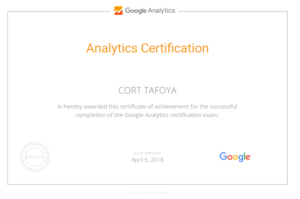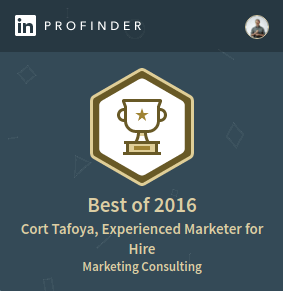Growth hackers generally attain that label by taking traditional acquisition channels and putting their own unique spin on them. When I owned a comedy website for two years, I took the basics of SEO and applied what is now known as predictive SEO to content and stories that I knew people would Google search for once they heard about them through another more popular channel.
Predictive SEO: How it Works
Multi-attribution should always be in the back of your mind when thinking about SEO. Television in particular can act as a visitor assist to your website if you have the right content set up. When someone sees a news story on TV and then types keywords from the story in to Google so they can attain more information, you could be the website they find if you play your cards right. For a lot of news publications, this strategy would have tons of value.
Here’s a super easy example of how I used predictive SEO based on previous keyword trends and what I anticipated people Googling. After a year as Editor-in-Chief I had seen comedian after comedian get in hot water for making jokes people deemed offensive. These stories had IMMENSE popularity – people loved to read them because people love controversy.
Case in point, when comedian and TV host Anthony Jeselnik tweeted out a joke about the Boston Marathon bombing literally hours after it occurred, people were irate, but more importantly, people wanted to know the joke.
“Anthony Jeselnik boston marathon joke”
“Anthony Jeselnik Boston marathon tweet”
“Anthony Jeselnik boston bombing”
Just look at Google trends and you’ll see a spike for these search phrases the day the story broke. Rather than using a journalistic title, like “Anthony Jeselnik Gets in Hot Water Again,” or “Comedian Anthony Jeselnik Just Can’t Shutup” I made the title of my article, “Anthony Jeselnik, a Boston Marathon Joke and Twitter.”
The result was thousands and thousands of web visitors over the subsequent weeks and months – and it only took me 20 minutes to execute.
To this day, the story lives on page one for those search phrases. Other examples of predictive SEO we did included using the names of skits as article titles when writing about the newest Comedy Central episodes. Knowing that people love controversy, we optimized articles around that specific keyword whenever a comedian said something people thought was out of bounds. Trends and search predictions were an essential part of growth hacking for our website.
Predictive SEO for Your Business – The Klooff and “Instagram for Pets” Story
When I first listened to PR Hacker’s Media Director Ann Murray share her company’s strategy and story at the Startup Leadership Program, I was totally onboard with their tactics. Their style of PR is highly effective, completely unique, and a direct reflection of the new media, which is 24/7, dying for click bait and more viral than ever. By mailing 7000 publications, and aiming for a 1-2% conversion rate, they can generate plenty of highly visible stories about your company in well read publications.
Most importantly, these are stories and headlines you influence. And the words you use in your media pitch will surely be keywords in the article once it gets published.
As a freelance SEO marketing consultant in San Francisco, I quickly saw the implication that PR Hacker’s viral marketing campaigns could have on building lasting search traffic for their clients. I was spinning from all the possibilities.
Last year PR Hacker worked their magic for an app called Klooff. One media outlet dubbed it “Instagram for pets,” others called it an “app for pet lovers,” or “the pet app.” Fast Company called it, “a social network for pets.”
For those who know what keyword research is, you can imagine how these never before used phrases were totally off Google’s radar.
But how much did they spike after all these news stories? And who would be there to capture this search traffic? Just look at the graph below.
Bonus Hack: Imagine if Klooff had an AdWords ad setup for this new, trending phrase. When an AdWords ad and organic result appear simultaneously on the SERP, that brand gets 50% more clicks on average. Plus, there would be no bid competition and the CPC would be dirt cheap.
As you move forward with your efforts to build buzz for your company, think about using the PR Hacker style in combination with predictive SEO.

How We Talk About the News Affects How We Search
You can imagine that after reading these news stories about Klooff, people texted their friends, talked to their families at dinner, or posted something on social media about how they’re going to create their pets first social media account. They might have remembered the company name, Kloof, but they surely remembered the concept: social media for pets, instagram for pets, a social app for pet lovers.
Those who hear the story second hand may not have been told the company name but they still retain the concept. And that’s who’s going to be searching for social media for pets, Instagram for pets, an app for pet lovers. As months go by, this is what people are going to Google and this could even become the dominant industry phrase where there are very few recognizable companies and startups.
How to Execute Predictive SEO
If you optimize your web pages ahead of going viral, you can capture a large share of this type of search traffic. This is especially important for statups – how publications like TechCrunch and Wired describe your product is how people are going to Google for your product.
I saw this first hand working for a tech education startup in S.F. We targeted the phrases used in these popular online magazines and were able to generate way more pageviews. Even though Google’s keyword planner suggested otherwise, we used the phrases in news outlets to dictate our SEO keyword strategy. In this case we were optimizing after news coverage happened – not before – and still had lots of success.
As months and months go by, these phrases may be what stick ahead of your brand name. Having multiple web pages with these keywords in the title tags, meta descriptions, urls, headers, and linked text can help you rank high enough to capture more web traffic. (SEO has dozens of other variables that are important, but let’s keep things high level for now.)
Essentially, these terms we’re targeting are new industry terms. Eventually your website will rise in the rankings as Google learns you’re what people mean when they’re Googling these completely new phrases.
Predictive SEO – Follow Your Industry News Stories
With predictive SEO and staying on top of breaking stories, you can build web traffic by writing blogs laced with the right keywords. Set up news based Google alerts for publications that write about your industry to stay on top of what’s trending.
These popular stories may be about changes in regulation, new waves of funding, new products, new features, new capabilities, partnerships or integrations. And anything that’s new has the potential to create a never before seen high volume search phrase.
Build web traffic by getting content up on your blog using the predictive SEO best practices described above, and become an industry thought leader at the same time by giving your opinion on the news.
If you have a great predictive SEO story, email me! I’d love to get it up on the blog. Thanks for reading.

